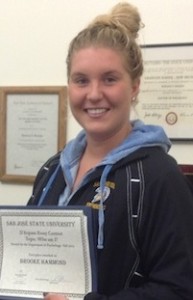SkyView Helps Fliers Avoid Gadget-Related Neck Strain
By Ashlee Vance

Walk down the aisle of any airplane and you’ll see passengers in a pose best described as “gadget crane”: necks bent downward at an acute angle so they can view their tablets or phones in their hands or resting on tray tables. Bryan McClain and Demetrius Madrigal have invented the SkyView Travel Tray Mount, an accessory meant to help fliers juggle their drinks and devices without straining their necks. SkyView hooks over the plastic latch of the tray table and can support the weight of an attached mobile device. While the idea is simple, the pair’s winding, years-long journey from conception to marketplace speaks to the sometimes quirky nature of invention.
McClain and Madrigal met at San Jose State University while pursuing master’s degrees in experimental psychology. They bonded over their studies of communication patterns in hostage situations and went on to train policemen around the world in negotiation techniques. In 2005, after struggling to keep that business going, they founded Metric Lab, a tech design firm that has consulted on products for Microsoft (MSFT), EBay (EBAY), BAE Systems (BAESY), and NASA. They put their behavior research to work, camping out at homes and taking notes as residents handled their remotes or computers. “We look for things that take a lot of time or that frustrate people,” says McClain. “They might not even notice the frustration, but we notice.”
McClain conceived of SkyView during a 2010 flight home to California from Costa Rica. He and Madrigal went on a months-long search for old airline seats so they could test their device. Most collectors of old plane parts were suspicious of their intentions, they say, but the pair finally connected with Interface Aviation, a seller of seats and other equipment for plane interiors in Hollister, Calif. Nestled among vineyards an hour’s drive south of Silicon Valley, its supermarket-size warehouse is stacked to the ceiling with old seats. The Metric Lab founders haggled with Peter Shamy, Interface’s director of sales, knocking the price of their first pair of seats from $800 to around $200.
From there, McClain and Madrigal brought in an industrial designer and an attorney to mock up the device, patent the design, and help pitch it to mobile accessory makers. Through LinkedIn (LNKD), McClain reached out to Griffin Technology, which licensed the device based on a prototype and specs for other models of airplane seats. “They came to us with a full incarnation of their idea rather than just a drawing on a napkin,” says Scott Naylor, director of product development at Griffin, which also sells cables, cases, and speakers.
Griffin sold out its first two production runs of SkyView through direct sales, which began in February. Now it’s also selling the device at Amazon.com (AMZN) and Wal-Mart Stores’ (WMT) website. The company says it plans to sell them in airport shops and other stores, but wouldn’t release a timeline or sales figures. Naylor says it’s “selling how we expected.” Gartner (IT) analyst Carolina Milanesi suggests that airlines could sell or rent SkyViews to passengers.
While McClain and Madrigal say they’ll return to consulting, they’re also planning another invention. (They wouldn’t say what it is, but their office is stocked with old seats from a baseball stadium.) Recently they drove back out to Hollister to give Shamy one of their devices. “This is really quite something,” he said. Then he swapped them 10 tray table latches for it.
The bottom line: Silicon Valley design consultants have created an accessory to make air travel less of a pain for mobile users.






